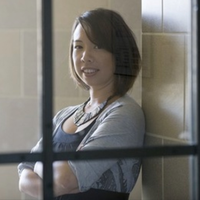Death Surrounds Her
Emily Rostkowski is an oncology nurse and cancer survivor herself. But now, like so many other healthcare workers, she spends her days in the center of the coronavirus storm.
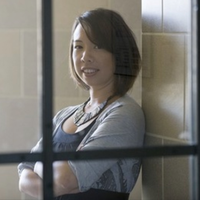
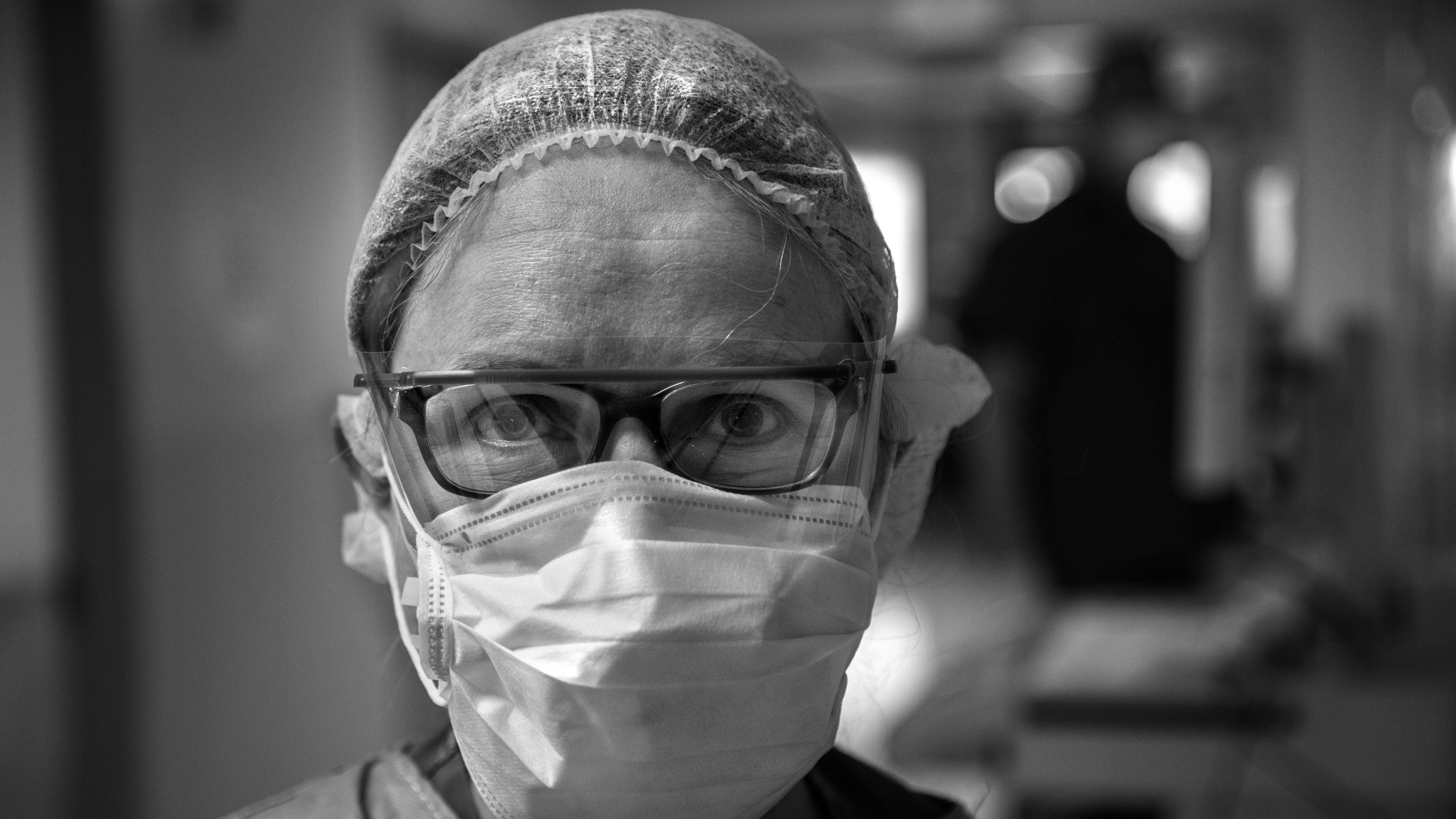
A patient on the third floor Covid-19 unit is tugging at her oxygen mask, trying to yank it off. She is 60, with a fever of 102.7, and her lips and mouth are dry from inhaling through the plastic. But every time nurse Emily Rostkowski quickly removes the mask to give the woman water or medicine, her oxygen levels plummet to perilous levels.
It is a little after 3 p.m. on Tuesday, March 24, at Holy Name Medical Center, a 361-bed hospital in Teaneck, New Jersey, and Rostkowski’s shift has just begun. Her Covid-19 wing has 14 beds. Each patient arrives here via bubble-encased rolling stretchers, and each has tested positive for the virus.
The woman who doesn’t want to wear her mask is separated from other patients and nurses by plexiglass windows and floor-to-ceiling walls of plastic sealed by zipper. Rostkowski knows it is a lonely experience for patients. They’re unable to see the facial expressions of their caregivers. They search for comfort or answers behind goggle-encased eyes. After Rostkowski finally manages to settle the woman, she leaves to check on her other patients.
Rostkowski, 46, is an oncology nurse. A breast cancer survivor. A mother of two. She began hearing about Covid-19 patients trickling into Holy Name in early March. Located in Bergen County, just across the Hudson River from New York City, the hospital is in the epicenter of New Jersey’s outbreak—on this day, 80 patients are being treated for the virus, with 25 of them in intensive care. At the beginning, the coronavirus patients were not yet under her charge. They went to intensive care or emergency instead. Now, the coronavirus patients are everywhere. While some cancer sufferers are still being treated, many patients with other ailments who are well enough have been discharged to make room for those with Covid-19. Each corner of Holy Name is prepping for the coming onslaught. Plans are underway to turn the hospital conference rooms, storage rooms, and pediatric wards into coronavirus units too. It is all-hands-on-deck.
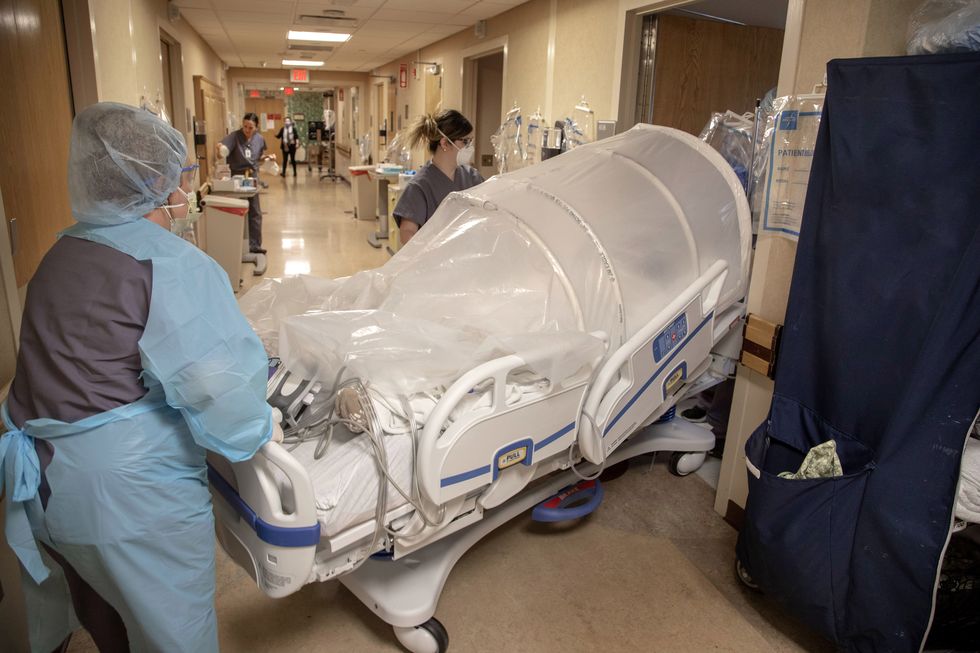
Hospital staff transport a patient in Holy Name Medical Center in Teaneck, New Jersey, during the first few days of the Covid-19 pandemic.
Right now, Rostkowski is a “floater,” assigned to wherever she is needed—and the needs are with the Covid-19 patients, their numbers swelling. Retired nurses and nursing students are being called in to serve. The governor of New Jersey announced 3,675 Covid-19 cases and 44 total deaths, the largest death count since the outbreak began.
One minute, a coronavirus patient will be okay, Rostkowski says. But in an instant, they can crash. She recalls one patient, “Out of nowhere, her lips were blue,” Rostkowski says. “These patients, if they are going to crash, they crash fast. They don’t give you forewarning. One minute they are fine. The next minute, ‘Oh my god, I can’t breathe…’ They are just lying in bed. They are oxygen starved. It’s scary.”
From a corridor, Rostkowski listens for patient bathroom calls and pleas for help via makeshift intercoms—rows of VTech baby monitors, the kind you might find at Target, each numbered (the quarantine system does not allow for pressing buttons, like the usual room bells). Patients who are mobile enough go to the bathroom in commodes wrapped in biohazard bags, which Rostkowski, wearing gloves, rids of carefully, so as not to let any of it splash on her.
Get exclusive access to fashion and beauty trends, hot-off-the-press celebrity news, and more.
These patients, if they are going to crash, they crash fast. One minute they are fine. The next minute, ‘Oh my god, I can’t breathe…
She no longer wears a disposable gown. The hospital is out of them. Staff rely on gowns laundered with silver ions. They are also low on N95 respirators and masks; staff members sterilize their used masks with UV light. When Rostkowski’s neighbors got word that her hospital was short on N95 masks, some dropped off boxes they had stashed in their garages for personal use.
Yesterday was Rostkowski’s day off after an exhausting week, and when she arrived back today, the hospital looked nothing like its former self. The façade, a stately red brick building, reminds her of the industrial scientific compound from Stranger Things. Newly erected silver tubes poke out of every window, like the legs of a giant octopus, sucking contaminated air out of the rooms. The lobby has also been transformed with tubes and every visitor chair removed.
A guard watches as Rostkowski cleans her hands at a sanitizing station. Another guard meets her to escort her between floors. The security measures are strict to ward off family members desperate to see their loved ones, monitor movement in and out, and make sure healthcare workers are using the safest precautions.
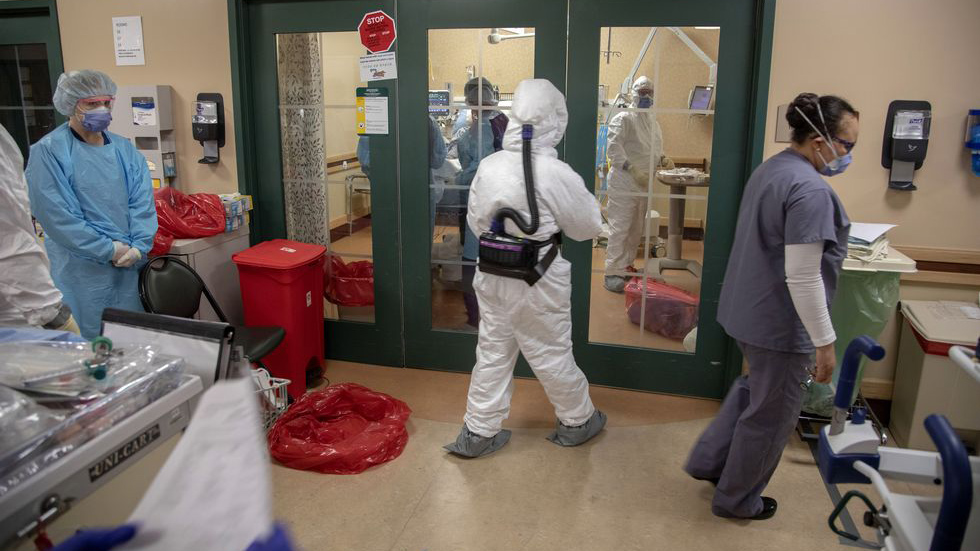
A caregiver in personal protective equipment (PPE) enters the room to intubate a patient.
At Holy Name, employees usually wear different color uniforms, signaling their roles. Nurses like Rostkowski wear white tops and black bottoms. Aides wear blue bottoms. Lab techs, beige. But now, every employee receives a pair of gray scrubs, which they change into on-site before their shift and remove before going home to avoid spreading contamination. Everywhere Rostkowski looks, she sees gray.
Before the Covid-19 outbreak, Rostkowski found fulfillment working in oncology because she could relate to the patients from when she had been one herself. When death came, she tried to bring comfort to families saying goodbye by fetching coffee carts and complimentary food for them as they waited by their loved ones’ beds in those final moments. After the patient took a last breath, Rostkowski allowed families to sit with the body for a few hours before it was taken to the morgue.
Rostkowski simply wants to make the ending as peaceful as possible for as many as she can. Death, she says, “on a normal day—not a Covid day—I see it as a relief from pain, a relief of years of treatment.” When you are battling a disease like cancer, there is a sense that you know what is coming, and you can prepare. When the end comes for her patients, Rostkowski says, “they are loved, they are celebrated, and death is just the next phase.”
They drove their loved one to the hospital room with a cough and a temperature and now they are dead.
But so many of these tiny gestures, these heartfelt goodbyes, have disappeared now, in the wake of Covid-19. Families of patients with coronavirus don’t have those last, tender moments together. They are not allowed to come anywhere close. They video call. “It’s heart wrenching,” Rostkowski says. “They drove their loved one to the hospital room with a cough and a temperature and now they are dead.” A Covid-19 death, Rostkowski says, “is like a car accident. Families are together today, and tomorrow they are not.”
At 6 p.m., Rostkowski returns to the bedside of the woman who doesn’t like wearing her mask. The woman is forlorn. She tells Rostkowski that she had not experienced human touch in days until another nurse, a friend of Rostkowski’s sat with her earlier and held her hand. So many other nurses, aides, or doctors dash in and out, always obscured by protective gear. Rostkowski grabs the woman’s hand through her gloves and holds it for a while too. She asks the patient to tell her about herself.
Rostkowski learns the woman is deeply involved in her local synagogue. She is a pillar in her community, once vivacious and full of energy, volunteering to help the poor, even founding a food bank. She recently became legally blind, but she has some vision left, with limitations.
“I lost my eyesight from a virus six years ago,” the woman tells Rostkowski. “I will be damned if I’m going to let this stupid coronavirus kill me now.”
Both women laugh.
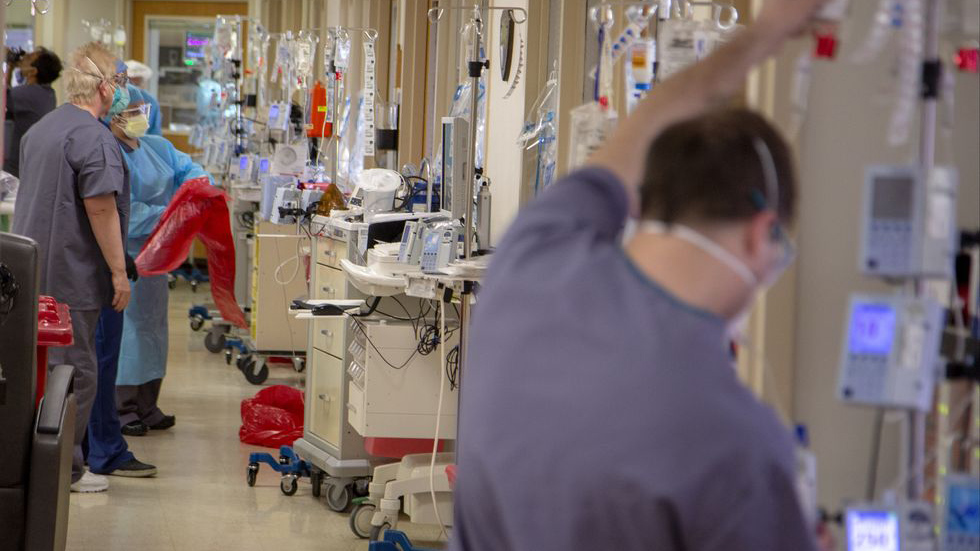
The hallway of the ICU at Holy Name Medical Center.
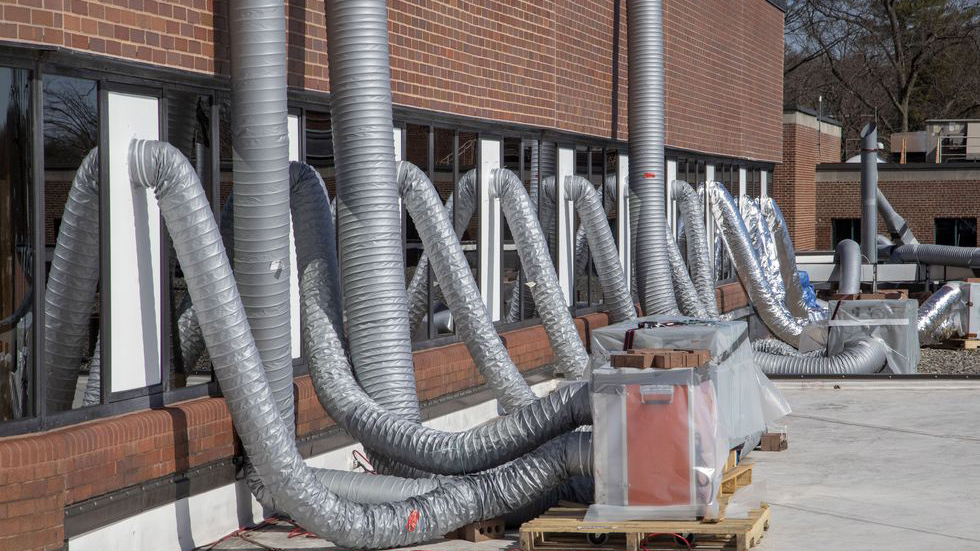
Rostkowski says tubing to remove contaminated air reminds her of the industrial scientific compound from Stranger Things.
The patient asks Rostkowski: How is this coronavirus crisis affecting the young people?
Rostkowski explains that she has a 14-year-old and a 17-year-old at home. She tells the patient that her oldest daughter’s prom was cancelled. But her daughter was particularly upset that a program she had been accepted into—a 15-day trip throughout Germany to learn about how Jews were persecuted during the Holocaust—was called off.
The patient picks up a napkin from her food tray. She motions for Rostkowski to bring her a pen. She begins to write down names of people she knows personally. Holocaust survivors. “Call them,” she tells Rostkowski. They will teach her daughter about the Holocaust. They will tell her about resilience. What they learned surviving mass death.
Rostkowski squeezes the woman’s hand and puts the napkin in her pocket. She knows she will not give it to her daughter anytime soon. The napkin could be contaminated. But Rostkowski will keep it herself. She wants to make a scrapbook full of meaningful hospital moments. She will preserve this napkin as one of the mementos.
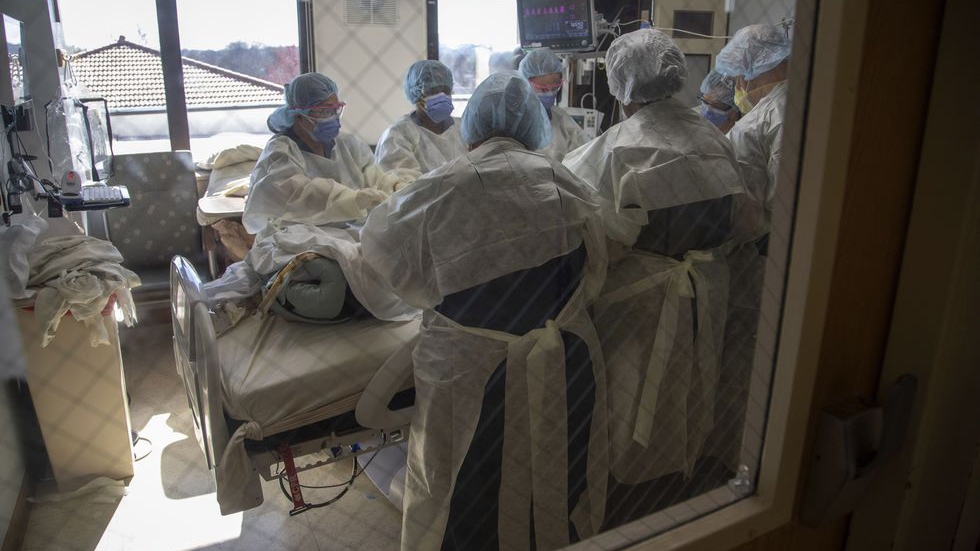
Caregivers treat a patient in the hospital’s ICU.
By midnight, Rostkowski returns home, exhausted. She enters through a side door, removing her shoes first. She empties her pockets of her ID badge, her stethoscope, and the napkin. She dumps it all on the counter before stripping off her clothes and throwing them into the basement. Naked, she runs to the shower.
All day, her head has been hurting. She thinks it must be from wearing the mask for so many hours on end. She holes up in the basement, careful to avoid her husband and daughters. She throws her clothes in the washer. She bleaches every surface she’s touched but in her head fog and fatigue, she forgets to hide away the napkin and other items she left on the counter.
Three hours of sleep later, Rostkowski returns to the hospital. It is Wednesday, March 25, and the intensive care unit is full. The emergency room is full. The lobby unit, which holds 18 beds, is full. The 6th floor is filling up. All coronavirus cases. Governor Phil Murphy announces that the statewide cases jumped by more than 700 overnight to 4,402. Another 18 deaths. A total of 62. Holy Name now has 100 coronavirus patients, with a quarter of them on ventilators. Only nine machines are left.
On the third floor, Rostkowski’s shift is a whirlwind. The woman who gave her the napkin has taken a bad turn. Her heart is beating too fast. She can barely breathe. The intensive unit is at capacity, so she is sent to emergency where there are extra critical care nurses on staff.
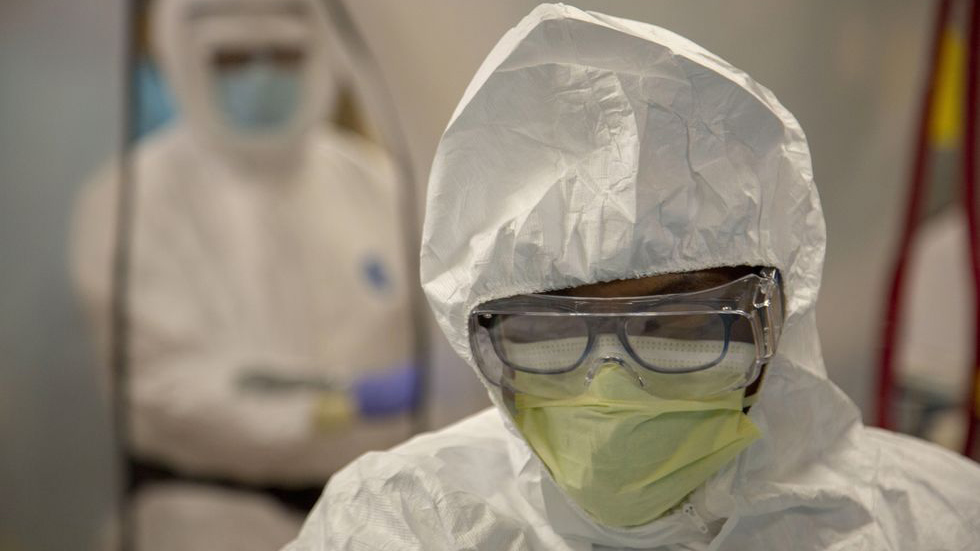
Though every precaution is taken to protect caregivers, more than 20 Holy Name staffers have been quarantined for suspected coronavirus.
The woman ends up under the care of Ashley Fitzpatrick, a 32-year-old nurse who normally works in a catheter lab. But like Rostkowski, she has been reassigned to work with Covid-19 patients. Fitzpatrick’s station is in the pop-up intensive care unit, which emerged to handle the overflow of Covid-19 patients. Most of Fitzpatrick’s patients come to her intubated—or sedated—and they are critically ill. Fitzpatrick, a mother who has been socially distancing from her own sons, ages 2 and 5, finds courage in her colleagues, all shrouded in masks. “I see my friends looking so scared in their eyes,” she says, “and yet acting so brave.” They know the peak is still coming.
Meanwhile, Rostkowski has never felt so fatigued. She knows it must be the lack of sleep, and the nonstop moving from patient to patient. Her head hurts worse than yesterday. Her shift ends at 7 p.m., but she stays late. By the time she gets home, she has no energy to do anything but sleep.
On Thursday, March 26, she is back at the hospital again by 6:50 a.m. This time, she is assigned to Lobby North, usually a unit for renal patients, but it now it is a Covid-19 unit too. There are 35 beds. She is assigned to a 79-year-old man who has a pacemaker, hypertension, a history of heart disease.
I see my friends looking so scared in their eyes,” she says, “and yet acting so brave.” They know the peak is still coming.
By 10 a.m., the man’s respiratory rates and oxygen levels have dropped. Rostkowski has him on a morphine drip. She knows he is dying. There is no one else to come to his side, no family is allowed to see the patients, no matter who you are. Some families are livid. They demand to be let inside.
This man is inside of a plexiglass box, called an isopod. It stretches over the top half of his mattress, encasing him like a giant, hollow ice cube, from head to waist. Coronavirus patients live inside of these clear cuboids. It is big enough for him to sit up while inside of it, but Rostkowski knows he will not be sitting upright again.
The box has side doors that open on hinges. Rostkowski opens up the door and puts her gloved hand on his. His eyes are open. She rubs his head. “It’s okay to be with God,” she tells him.
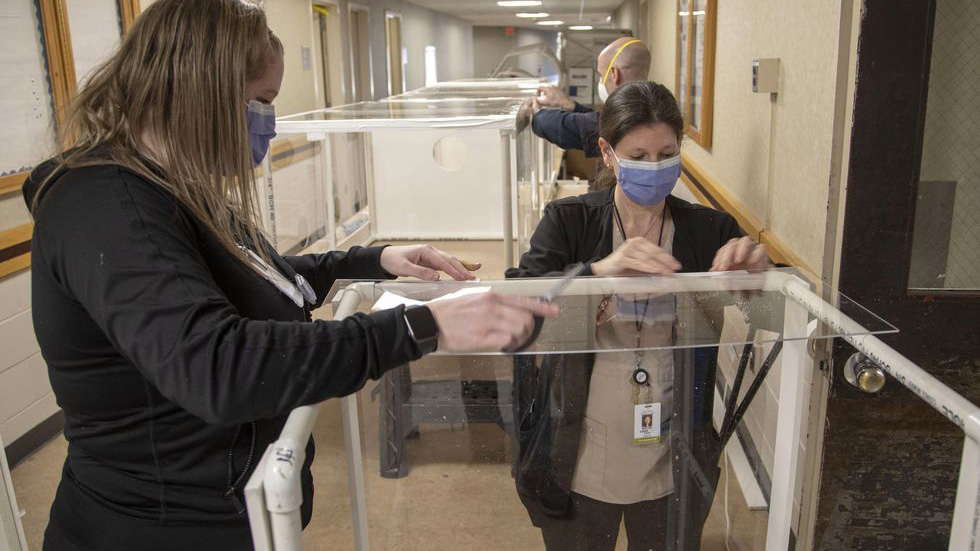
Employees from the cardiology unit help assemble isopods to care for COVID patients.
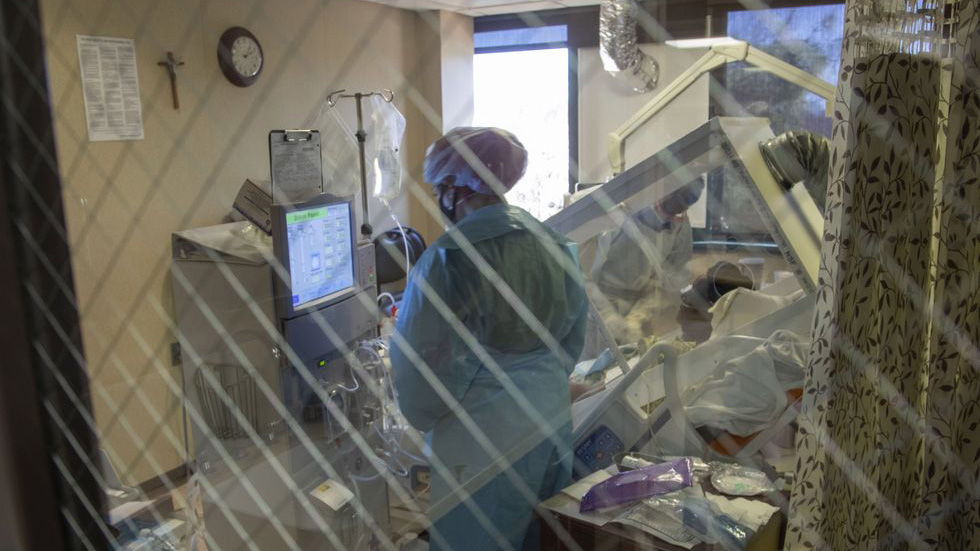
Caregivers treat a patient in an isopod.
He closes his eyes and lets out a sigh. He is gone.
Rostkowski covers him with a sheet and goes to the nurse’s station. She is sobbing. The man is one of 13 Covid-19 deaths so far at Holy Name. Rostkowski can’t stand to see them die without their loved ones. When her own grandfather passed away in bed, her grandmother was right there with him. “You’re not supposed to die alone. Not when you have family.”
The manager points to a woman being rolled down the hallway on a bubble-encased stretcher. Another Covid-19 patient. “That’s his wife,” she says.
Rostkowski pulls herself together. She has to call the coroner. The coroner’s office asks about his details: Age? Gender? Was it Covid?
Post-mortem care is nothing like it used to be before Covid-19 seeped into Holy Name. Usually when a patient passes away, nurses and staff go to great care to remove IVs, catheters, any lines, drains. They wash the body. Remove the colonoscopy bag. Make the body look as clean as possible before it is picked up. Now, they are directed to leave everything attached to the body. No removing of any items that could be contaminated with fluids. Put all of it, every tube, every device, into the body bag. Write “communicable disease” on the toe tag. Wipe down the exterior of the bag with bleach.
“It doesn’t feel real,” Rostkowski says.
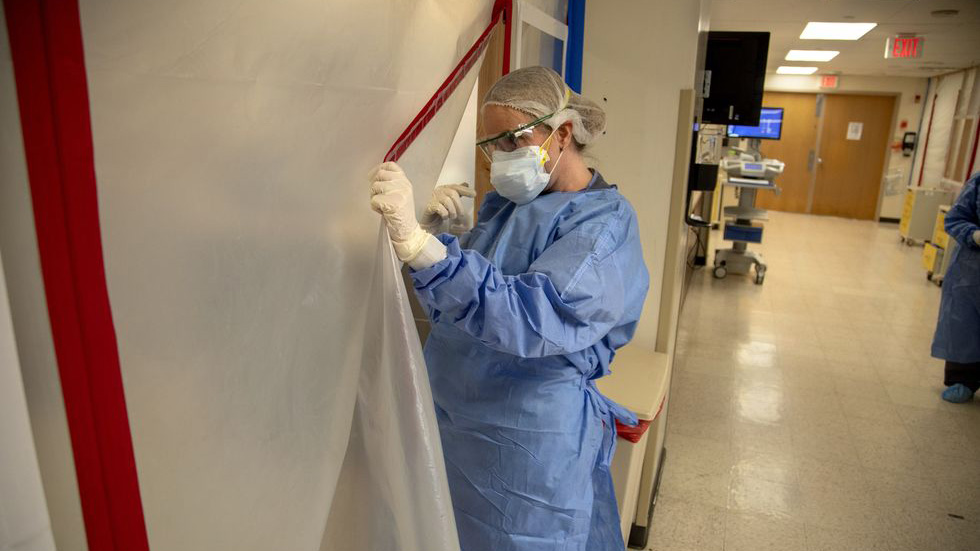
Rostkowski enters the "room" of a patient suffering from Covid-19.
By 3 p.m., a colleague of Rostkowski approaches. She has the chills. Rostkowski takes her temperature. It is 102.4 degrees. An infectious disease doctor passing by notices and tells the nurse to go directly to the employee health tent outside of the hospital emergency room to get tested for Covid-19. When she’s done, he tells her, go home.
Rostkowski is ready to go home now too. After 12 hours of wearing the N-95 mask her nose hurts. Her head pounds. She thinks it is from the straps pressing against her skull. Her ears sting. Her mouth is parched. Her stomach aches. She gets home, tries to eat a Lean Cuisine, and quarantines herself away from family for another night, falling asleep on the air mattress in the basement.
By Friday morning, March 27, Rostkowski’s headache is still pounding. She has chest tightness, nausea, diarrhea, chills, and a cough. When she is not in bed, she is in the bathroom. She cannot eat anything. She has a fever of 101 degrees. She calls hospital employee health. Rostkowski needs to stay home. She will receive tele-health calls, and she should get tested for Covid-19.
By now, Holy Name has at least 20 healthcare workers and other staff under quarantine because they may have been infected with coronavirus.
It is rainy and cold on Saturday, March 28, when Rostkowski drives herself to Holy Name around noon. Two Army-sized tents sit outside. The blue one is for the community. The beige one, for staff. A flashing sign reads: “Flu-like symptoms here.” Rostkowski is shivering and feverish as she waits 25 minutes in line for her turn.
Once inside the tent, she spots a coworker who is also her friend. She knows it is her immediately, even though she is covered completely in protective gear. Rostkowski bursts into tears, overwhelmed by all of the events of the last week, and the friendly face before her.
“It’s okay, Emily,” her friend says. “Breathe in, you’re okay.”
That day, three of Fitzpatrick’s Covid-19 patients passed away in a row.
She sends her through the back door of the tent, where Rostkowski meets another masked nurse. This nurse usually works in the endoscopy department and is now in charge of the coronavirus swabs. She tells Rostkowski she will be conducting the BioFire diagnostics test, which usually tests for flu, bacteria, parasites, and more. This one will test specifically for Covid-19.
Rostkowski knows what it was like to give this test. It is a long nasal swab that goes “all the way up your nostril into the back of nasal passage,” Rostkowski says. “People joke it’s touching your brain.”
Rostkowski clenches the back of her chair and tilts her head back. First nostril. Then repeat. Rostkowski does not make a sound.
“Wow, you got the gold star for patients today,” the nurse tells her.
Rostkowski returns home to rest. Results will not come back for at least four days.
All weekend, Rostkowski cannot eat. She is sleeping in the master bedroom now, with her husband in another part of the house. This way, she has her own bathroom. Less contamination. The family drops off trays off food at her door. Neighbors drop off Tylenol at her front gate.
Finally, on day four, her fever breaks. She manages to eat chicken and rice. She goes outside to get fresh air. She can’t stop watching the news or reading updates on her phone. The governor announces 3,347 more Covid-19 cases, 16,636 in the state. 198 deaths—more than four times the number from Rostkowski’s first shift last week.
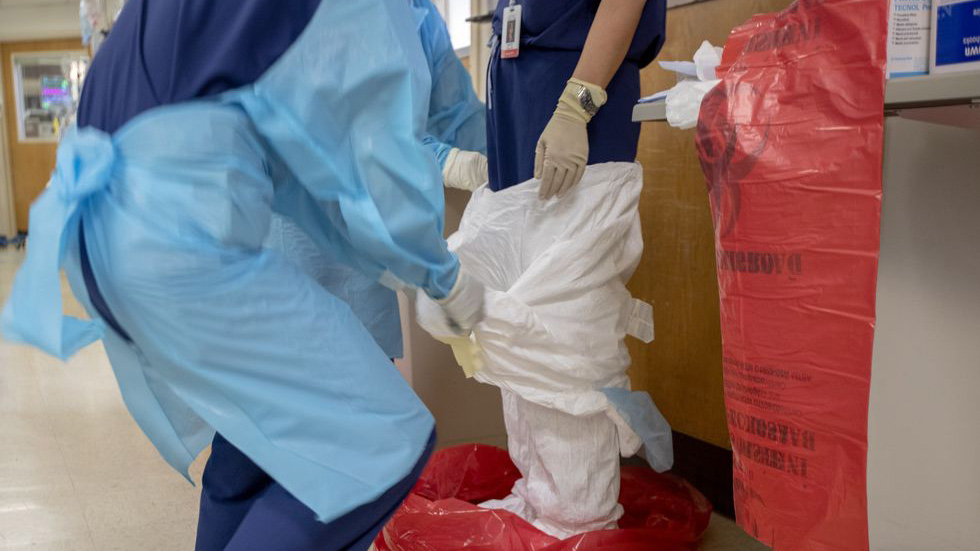
A nurse assists another care giver in removing their personal protective equipment carefully to avoid contamination.
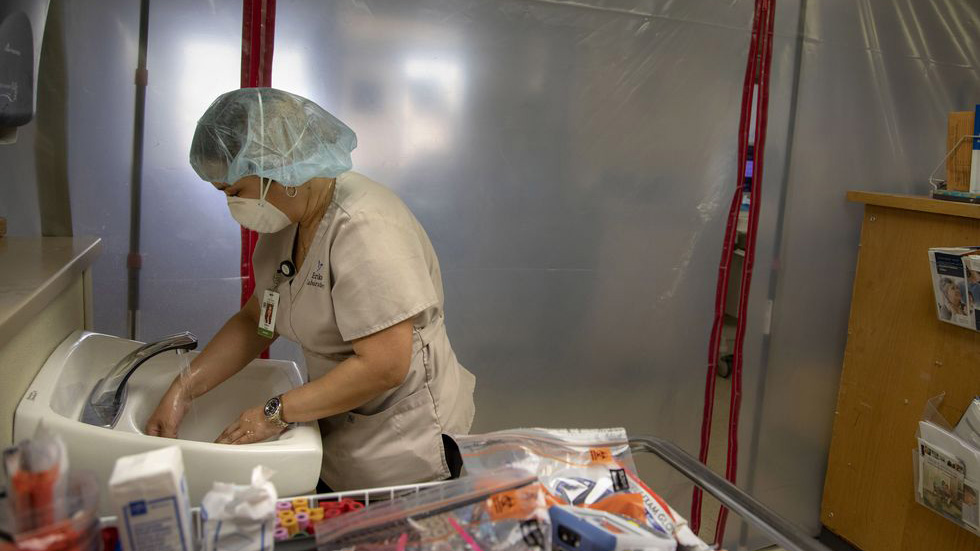
Phlebotomist Erika Rivera washes off in the ICU.
Rostkowski’s mom is 74, her dad is 76. They live on the 21st floor of a building in Weehawken, New Jersey, which has an unobstructed view of the Statue of Liberty. Her dad has severe pulmonary fibrosis. “He is very, very high risk. If he was to get [Covid-19] he would die.” Rostkowski used to bring groceries for them, but she cannot do that now.
On Monday, her parents send her a photo they took of the USNS Comfort, a Navy ship, arriving in New York. Rostkowski scrolls through news reports. She sees images of crowds gathered at the pier to witness its arrival. “Hundreds of New Yorkers,” she says, many without masks. “It infuriates me.” Do they not understand what is happening inside of the hospitals? Do they not care?
On Tuesday, March 31, a nursing colleague calls Rostkowski to check in. She gives her an update on the 60-year-old woman, the one who did not like to wear her mask, the one who gave Rostkowski the names of the Holocaust survivors.
The woman passed away last night, she tells her.
It was nurse Fitzpatrick who took care of the woman. Held her hand in those final moments. Fitzpatrick never got a chance to have a conversation with her, not in the way Rostkowski did. But she tried to serve as a family member for the ones who could not come. A silent comfort. A gentle touch. That day, three of Fitzpatrick’s Covid-19 patients passed away in a row. Fitzpatrick says, “I hope she knows she is loved.”
Rostkowski’s heart drops at the news. Her knees feel weak. She thinks about the napkin. Where did it go? It has disappeared. She discovers one of her daughters found it while cleaning up. Thinking it was trash, her daughter threw it away.
Rostkowski feels helpless at home. She still has not received her test results. She cannot control any of this. She wonders, what is taking so long? She reads there is a backlog on thousands of coronavirus tests, leading to delays in results. Meanwhile, news reports surface that a batch of 1,000 N95 masks that Holy Name ordered for it staff didn't provide adequate protection and had to be returned. The hospital bought them from a trusted vendor, but scam artists took advantage of the desperation.
I am so antsy to get back. I would like to go represent my unit. I want to hold up the fight.
Rostkowski wants to know when she will be cleared to return to work. Her team needs her. So many are out sick. So many sick people are still arriving at Holy Name. Patients need her. “I am so antsy to get back,” she says. “I would like to go represent my unit. I want to hold up the fight.”
Rostkowski no longer feels ill. It is Saturday, April 4, and Holy Name is now treating 150 patients for Covid-19. In all, it has tested 1,963 patients, with 1,111 people receiving positive results and another 222 pending.
Forty-four of its patients have died from the virus—including three staff members. Twelve Holy Name doctors have been infected, with two of them now hospitalized. Governor Murphy announces that the state has lost more lives to coronavirus than it did to the September 11 attacks.
Twelve days have passed since the onset of Rotkowski’s first symptoms. She finally receives her Covid-19 test results. They come back positive.
This article has been updated.
Erika Hayasaki is a Southern California-based writer who teaches in the Literary Journalism Program at the University of California, Irvine.
